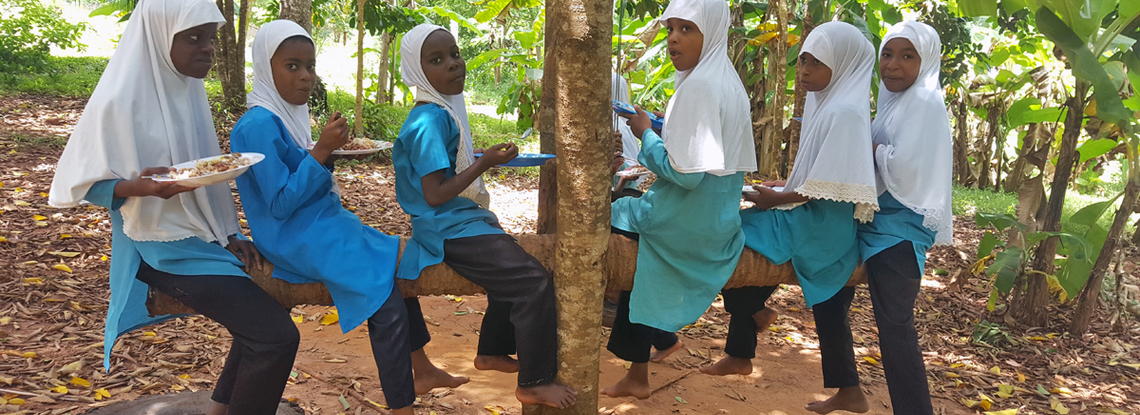
Starting into Life from the Back of the Field
The little Waldorf School of the Creative Education Foundation in Zanzibar started 2012. In the semi-autonomous island state off the cost of Tanzania, half of the population lives below the poverty line; about 12 percent of children are malnourished. School founder Judi Palmer wanted to present the children of the island with an alternative to the often-overcrowded schools and quickly opted for Waldorf education. The Berlin-based Waldorf teacher Sönke Bohn was in Zanzibar for six weeks, as a mentor. For “Waldorf Worldwide” he reports about the school.
A good education often is the only way out for children from disadvantaged backgrounds. Be it poverty, unstable, cracked, or completely collapsed familial or social structures or even everything together – for many of the people concerned, education is often unimaginable, yet it represents the only path into a prosperous future. Prosperous, because the circumstances allow it, and these circumstances then allow for a space in which self-effective powers can take action and are allowed to become effective. It is not just Central Europeans who struggle to make responsible use of their own and the local resources; also elsewhere people have to make a strenuous effort to achieve this goal, often under much less comfortable circumstances.
Personal and professional experiences had motivated Judi Palmer, an entrepreneur from Stone Town, Zanzibar (Tanzania), to become active in this field, by founding a school as a place to prosper – in particular for children who begin life from the back of the field. She considered different educational concepts, and soon it became clear that the school was going to be a Waldorf School. Carefully adjusting to the cultural and social conditions, she set to work with determination.
Pragmatically she cast her fishing rod into the World Wide Web and found Dorian Keller, a Swiss-English teacher and painter, who consented to accompany the founding of the school. With two young local teachers, he immersed himself into this trailblazing educational project.
By now, the small school of the CEF-Zanzibar (Creative Education Foundation Zanzibar) is in its sixth year. At first, in February 2013, the school consisted of a Kindergarten and a first, then a second grade, and was situated in Fuji Beach close to Bububu. In January 2015, the school was able to purchase a property of more than three hectares, where the children now go to school up to fifth grade. Whereas the local state schools have classes with 100 to 180 students – a challenge that can hardly be mastered by the teachers – 12 to 17 children attend one class at the CEF School. But it is not only the size of the classes that represent a change in the children’s life circumstances. While children who attend state school often also have to go to a Madrasa (Qu’rānic school); at this little Waldorf School this is integrated into the school day. This spares the children from strenuous parallel studying and also from the usual teaching methods.
But also the teachers need and receive support. Financed by the Friends of Waldorf Education, some of the teachers attend the intensive courses at the Waldorf teacher seminar in Nairobi. In this way they receive valuable suggestions and guidance for the day-to-day work with the children. On site, the teachers receive support from invited colleagues, who do some mentoring and give advice. Some sponsors, mainly local restaurant owners, finance the school. Only five of the sixty children pay for fees and tuition. Many of the children are orphans or half-orphans, where much is to give, but little to get.
In the first two years, Swahili is working language; from third grade on, the main lessons are taught in English. The development of the lower senses, much discussed in central Europe, is fostered by the lush, warm natural surroundings. The children often walk barefooted in the school’s jungle, and those who want to have tangerines, bananas, papayas, mangos, coconuts, and whatever else they care to eat, can and have to climb for it.
But also playing ball is, like everywhere else in the world, popular during recess. Children and teachers meet in an atmosphere of warm joy. Everybody has to learn a lot and they meet their tasks with devotion and with the highest possible expectations for themselves, children as well as teachers. In a truly paradisiac nature, in an almost non-existent cultural infrastructure, a seed starts to grow, that can open up a bright future for and thanks to the children, as put by the volunteer Mohamad from Saudi Arabia.
The diet plays an important role at the school, because you cannot study on an empty stomach: Before morning assembly the children have porridge and a few dates, during breakfast break two to three little pancakes and some tea, later on lunch and at the end of the school day they will have an egg and some fruit for the way home. The expenses of about $ 1 per day can only be paid for through donations. It sounds like a small amount of money for a nutritious meal, and it is. “The children need richer food and a higher intake of calories”, explains Judi Palmer. She aims to have about $ 1,50 available per child for food. She can reach this goal with about € 1.400 per month for the current number of pupils – for this, we still need help.
Sönke Bohn
Donation account:
Freunde der Erziehungskunst
GLS Bank Bochum
IBAN: DE47 4306 0967 0013 0420 10
BIC: GENODEM1GLS
Keyword: School meals Zanzibar
